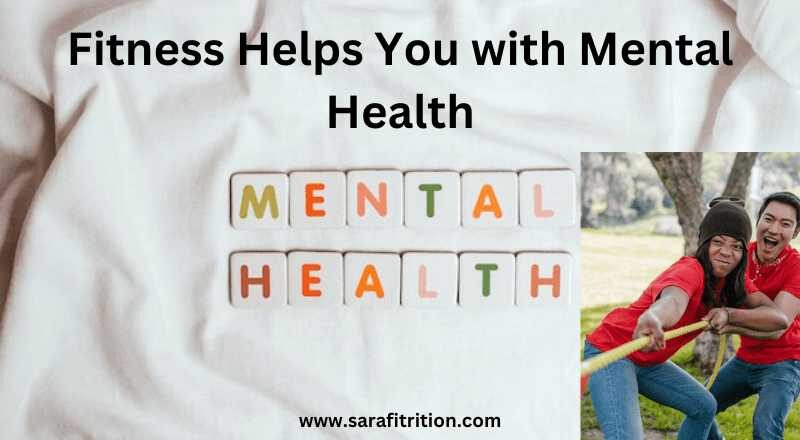Mental health is just as important as physical health & it’s crucial to take care of both. Fitness can help improve mental health in several ways. Exercise releases endorphins, which have mood-boosting effects. Physical activity can also help reduce stress & anxiety. Working out can also give you a sense of accomplishment & boost your self-esteem. If you’re struggling with mental health issues, fitness can be a great way to manage them & improve your quality of life.
Why the Mental Fitness Important

Mental fitness is important for a number of reasons. It can help improve your mood, increase your focus & concentration, reduce stress & improve your overall physical health.
Mental fitness is often overlooked when it comes to overall health & wellness. However, it is just as important as physical fitness. In fact, mental fitness can help you reach your physical fitness goals.
Here are some of the benefits of mental fitness:
- Mental fitness can help improve your mood.
If you are feeling down, stressed, or anxious, mental fitness can help. Exercise, relaxation techniques & positive thinking can all help to improve your mood.
- Mental fitness can help increase your focus & concentration.
When you are mentally fit, you are better able to focus on tasks & complete them. Mental fitness can also help you to concentrate for longer periods of time.
- Mental fitness can help reduce stress.
Stress can take a toll on your physical & mental health. Mental fitness can help you to cope with stress in a healthy way.
- Mental fitness can help improve your overall physical health.
Mental fitness & physical fitness are closely linked. When you are physically fit, you are more likely to be mentally fit and vice versa.
How fitness can help you with mental health
Fitness & mental health are two sides of the same coin. Good mental health requires a strong & healthy body & vice versa. That’s why exercise is an important part of any mental health treatment plan.
Exercise has powerful effects on your mood & overall sense of well-being. It can help relieve stress, boost your energy levels & improve your sleep. Regular exercise has also been shown to reduce the symptoms of anxiety & depression.
In addition to its mood-boosting effects, exercise also has a number of physical benefits that can help improve your mental health. Exercise can help you:
-Reduce stress
-Boost your energy levels
-Improve your sleep
-Reduce the symptoms of anxiety & depression
– improve your mental health.
Benefits of exercise for mental health

The benefits of exercise for mental health are numerous & well-documented. Exercise can help to improve mood, reduce stress & anxiety, improve sleep & increase overall well-being. Here are five specific ways in which exercise can benefit mental health:
- Exercise can help to improve mood.
Exercise has been shown to be an effective treatment for depression. It can help to improve mood by releasing endorphins, which are chemicals that act as natural mood boosters. Exercise can also help to reduce stress & anxiety, both of which can contribute to feelings of depression.
- Exercise can help to reduce stress & anxiety.
Exercise has been shown to be an effective treatment for both stress & anxiety. It can help to reduce stress by releasing endorphins, which are chemicals that act as natural stress relievers. Exercise can also help to reduce anxiety by increasing levels of serotonin, a neurotransmitter that is known to have calming & anti-anxiety effects.
- Exercise can help to improve sleep.
Exercise can help to improve sleep by reducing stress & anxiety, which can both interfere with sleep. It can also help to improve sleep by increasing levels of serotonin, which can promote better sleep.
- Exercise can help to increase overall well-being.
Exercise has been shown to improve overall well-being by increasing levels of endorphins, which are chemicals that act as natural mood boosters. It can also help to reduce stress & anxiety, both of which can contribute to feelings of depression.
- Exercise can help to improve cognitive function.
Exercise has been shown to improve cognitive function by increasing levels of brain-derived neurotrophic factor (BDNF), a protein that helps to support the health of nerve cells & promote brain plasticity. Exercise can also help to reduce stress & anxiety, both of which can interfere with cognitive function.
How to use fitness to improve your mental health

It has been scientifically proven that physical activity can have a positive impact on mental health. According to the National Institute of Mental Health, regular exercise can help reduce symptoms of anxiety & depression, improve mood & increase energy levels.
There are a number of ways that fitness can help improve mental health. Exercise releases endorphins, which have mood-boosting effects. Endorphins are also known to reduce stress & improve sleep quality. Exercise also helps to increase levels of serotonin, a neurotransmitter that plays a role in regulating mood.
In addition to the direct impact that exercise has on mental health, being physically active can also help to improve self-esteem & body image. Regular exercise can lead to weight loss, muscle gain & improved stamina & strength. These physical changes can lead to increased confidence & a better overall outlook on life.
If you are looking to improve your mental health, there are a number of ways that fitness can help. Regular exercise is a great way to start, but be sure to consult with a mental health professional to create a comprehensive treatment plan that meets your unique needs.
The best exercises for mental health
It is no secret that exercise is good for your physical health. But did you know that it can also have a profound effect on your mental health? In fact, exercise is an effective treatment for several mental health conditions, including anxiety, depression & PTSD.
Here are some of the best exercises for mental health:
- Walking
Walking is a great way to get some exercise & fresh air. It can also help to clear your mind & boost your mood. If you’re feeling anxious or down, a brisk walk can help to lift your spirits.
- Running
Like walking, running is a great way to get some exercise & fresh air. It can also help to improve your mood & alleviate symptoms of anxiety & depression. Running can be a great way to blow off steam & release built-up tension.
- Yoga
Yoga is a great way to calm your mind & ease stress & anxiety and it can also help to improve your flexibility & strength. Yoga can be done at home or in a class setting.
- Tai Chi
Tai chi is a form of exercise that involves slow, graceful movements. It is often described as “meditation in motion.” Tai chi can help to improve your balance, flexibility & strength. It can also help to reduce stress & anxiety.
- Pilates
Pilates is a form of exercise that emphasizes controlled movements & proper posture. Pilates can help to improve your flexibility, strength & balance. It can also help to alleviate symptoms of anxiety & depression.
- Weight Training
Weight training is a great way to improve your strength & muscle tone. It can also help to reduce stress & improve your mood. Weight training can be done at home or in a gym.
- Swimming
Swimming is a great way to get some exercise & relief from stress. It can also help to improve your mood & alleviate symptoms of anxiety & depression and it can be done in a pool or in the ocean.
The importance of diet for mental health

The mind & body are interconnected. What you eat affects how you feel & how you feel affects what you eat. When it comes to mental health, what you eat is just as important as getting enough exercise & getting enough sleep.
There are a few key nutrients that are particularly important for mental health: omega-3 fatty acids, vitamin D, iron & magnesium.
Omega-3 fatty acids are found in fatty fish, such as salmon, mackerel & tuna & in flaxseeds, chia seeds & walnuts. They are important for brain health & have been linked to a reduced risk of depression, anxiety & ADHD.
Vitamin D is found in fatty fish, fortified milk & orange juice & eggs. It is important for brain development & has been linked to a reduced risk of depression.
Iron is found in red meat, dark leafy greens, beans & fortified cereals. It is important for mood & cognitive function & can be deficient in people with depression.
Magnesium is found in dark leafy greens, nuts, seeds & whole grains. It is important for energy production, sleep & muscle & nerve function. Deficiencies have been linked to anxiety & depression.
In addition to these key nutrients, a balanced diet that includes a variety of fruits, vegetables, whole grains & lean protein is important for mental health. Eating a healthy diet can help to reduce stress & improve mood.
There are a few things to avoid if you want to maintain good mental health. Processed foods, sugary foods & caffeine can all contribute to anxiety & depression. It is also important to avoid alcohol, as it can worsen anxiety & depression.
If you are struggling with mental health, a healthy diet can be a valuable part of your treatment plan. Talk to your doctor or a registered dietitian to develop a plan that is right for you.
How to make fitness a part of your mental health routine

The mind & body are intricately connected, so it’s no surprise that your physical health can have a major impact on your mental health. Likewise, maintaining a healthy lifestyle can help reduce your risk for developing mental health conditions, such as anxiety & depression. While there’s no one-size-fits-all approach to mental health, adding some form of fitness into your routine is a great way to support your mental wellbeing.
Here are a few ways that fitness can help improve your mental health:
- Exercise releases endorphins
When you exercise, your body releases endorphins, which are hormones that boost your mood. Endorphins interact with the receptors in your brain that reduce your perception of pain. They also trigger a positive feeling in the body, similar to that of morphine.
- Exercise reduces stress
Exercise can also help reduce stress. Stress is a normal response to situations that make you feel threatened or overwhelmed. When you’re stressed, your body releases a hormone called cortisol and is also known as the “stress hormone” because it’s released in response to stress.
- Exercise improves sleep
Getting regular exercise can also help you sleep better. This is because exercise can help to regulate the hormones that control your sleep cycles. If you have trouble sleeping, exercise can help you fall asleep faster & sleep more soundly.
- Exercise boosts self-esteem
Regular exercise can also help to boost your self-esteem & confidence. This is because exercise can help to improve your physical appearance & make you feel good about yourself.
- Exercise can be a form of self-care
Taking care of your body is an important form of self-care. When you make time for fitness, you’re giving yourself the time & attention that you need. This can help you feel more balanced & in control of your life.
Making fitness a part of your mental health routine is a great way to support your overall well-being. Exercise can help to improve your mood, reduce stress & boost self-esteem. And, when you make time for fitness, you’re giving yourself the self-care that you need.

